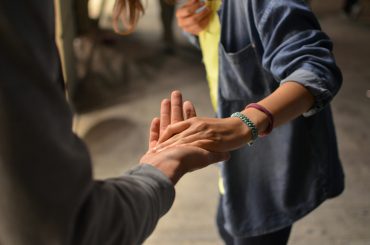It wasn’t until I had several years in sobriety that I realized how much help I really needed. I was in graduate school, going back to become a mental health counselor (or so I thought at the time, God had other plans). I knew that I wanted to help other women who had lived through what I did, so I thought this was the best route to go. For the graduate program, we had to pick an internship. An advisor helped me to select one that was very much outside of my comfort zone. They thought it would fit me well as an older “non-traditional” student. I would later understand the significance of how trauma and recovery go hand in hand and why we need to start talking about recovery and trauma as connected issues.
My PTSD triggers.
My internship was with an addiction treatment center for Veterans at a local VA hospital near where I lived at the time. For someone with a history of trauma, it was one of the most challenging—yet amazing—experiences I had up until that time. I have a long history of military service in my family and also personal history with trauma and PTSD. This placement fit on a number of levels.
What I didn’t realize when I signed up, was how triggering it would be for me. I didn’t even have the language at the time to express what I was experiencing. The flashbacks, disassociation, flat affect and shutting down hit me like a freight train. I started seeing a therapist again once I realized how bad the anxiety and related trauma symptoms were getting. While at school I was learning how to conduct group therapy. At the same time at the Veteran’s treatment center I was feeling like I was going through the treatment myself. During one particular group, the room started to spin and a familiar choking feeling settled in the back of my throat. Beads of sweat formed on my forehead and I looked down at my shaking hands in my lap. I had to run out and almost vomited in the group facilitator’s office.
Trauma was fully entrenched in me.
The pain, instead of being buried deep inside, was starting to resurface. It was becoming something visceral. Something I could finally look at and say to myself: “there it is!” I was learning for the first time in my life how fully entrenched trauma and its symptoms were in my mind and body. If I wanted to grow in my addiction recovery or even stay in abstinence-based recovery, I was going to need to do something about it. It was time.
I’m not the only one.
According to the National Institute on Drug Abuse, nearly 80% of women have experienced some type of trauma. Research also shows how along with the interconnection of trauma and addiction, there is an increased risk for developing PTSD. This applies in particular to those who have experienced sexual trauma. What does this mean? Many of us—I’d argue most of us—have trauma that we need to address in order to grow and move forward in recovery.
Dr. Van Der Kolk, who wrote a foundational work on trauma called The Body Keeps the Score asserts that “as long as the trauma is not resolved, the stress hormones that the body secretes to protect itself keep circulating, and the defensive movements and emotional responses keep getting replayed.” It’s no wonder that so many people, including me, turn to unhealthy coping mechanisms to ease this suffering, one of the most popular being substances like alcohol and other drugs.
My therapists’ suggestion.
I talked to my therapist and she suggested the evidence-based practice called Seeking Safety (https://www.treatment-innovations.org/ss-description.html). This therapy was designed for people with a history of trauma and/or addiction. It focuses on coping skills to help you become safer in your relationships, thinking, and actions. Talking to a therapist, starting a new type of counseling, and really taking a look at my trauma in a mindful way, really started to make all the difference. Not surprisingly, what followed was the letting go of unhealthy relationships and learning new tools for managing symptoms. I had struggled all my life with anxiety and dissociation with tools like grounding and meditation or prayer, I had a solution.
I found compassion for myself.
Once I learned about some of the symptoms, “I’m crazy” or “something is wrong with me” became a much more grace-filled and compassionate understanding of myself. The heightened sense of fear, startle-response, anxiety and depression began to fade when with my new tools. Practical tools for healing the limbic system and its responses (this system is responsible for the fight or flight response in the body) provide immense relief. I also felt a new sense of peace after being diagnosed with PTSD. How I had lived for so long finally started to make sense.
We need to start talking about addiction and trauma. I know from personal experience how transformative addressing both addiction and trauma can be. I know that I was able to get unstuck from some pretty destructive habits and relationships when I took action steps to learn the practical skills I needed to move forward.
Healing is not a mystery. It’s not reserved for the ultra-religious or perfect AA member. Healing can be a choice. Each day that we have is an opportunity to choose to do the next right thing. And sometimes, this next right thing is choosing to take care of ourselves and to embrace all of our story, including the painful parts we’d rather stay buried. Not to stay there, but to learn and grow beyond it so we can be fully present for the next amazing chapter. And let me say, it only does keep getting better and better!






